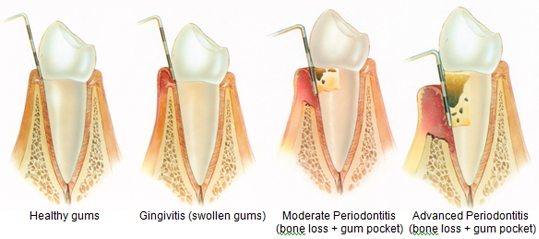There are 2 distinct conditions that are often referred to generically as gum disease, gingivitis and periodontitis. Understanding these conditions, what to look out for and how to prevent them it important for good oral health long term.
Gingivitis
The word gingivitis literally means inflammation (-itis) of the gums (gingiva). Plaque, the soft white stuff that builds up on our teeth, is essentially just a build-up of bacteria.Our body doesn’t like it and when it’s left sitting on the gums for too long (if we don’t clean properly), the body decides that it needs to protect itself and produces an immune response to try and fight it, inflammation. The gums become more swollen, they become redder, and they start to bleed easily. Because the bacteria it’s trying to fight is not actually within the tissues and it can’t actually kill it off, the gums are left in this constant state of inflammation. Often people will then find that their mouth bleeds when they brush, which makes them even less likely to clean properly, making it worse.
Fortunately, gingivitis is easily reversible. As soon as the teeth are cleaned of plaque and kept clean, the gums return to a healthy state. It is important to not let bleeding in the short term stop you from cleaning well, as the thorough cleaning is what will ultimately bring the gums back to heatlh. (although if it persists after a week or 2 it would be worth getting it checked out). Given that the toothbrush can’t get between teeth very well, it is worth noting that flossing is important as well, and that bleeding when you floss is a sign you need to do it more, not less!

Periodontitis
Periodontitis is also an inflammatory condition, but rather than just affecting the gums as in gingivitis, periodontitis affects the underlying bone and connective tissue as well. Periodontitis is a progression from gingivitis if left untreated for extended periods of time.
As described above, gingivitis causes an inflammatory response as the body tries to protect itself from the threat of the bacteria sitting against it. At some point the body decides is can’t fight it off, so it’s going to retreat, and the gums, along with the underlying bone and connective tissues start to shrink away. Unfortunately, due to the inflamed gums, this starts to create much deeper areas for the bacteria to get into and hide, which can cause the problem to snowball. Unlike gingivitis, periodontitis is irreversible. Once the bone is gone, it is gone, which can lead to recession, loose teeth, and in more severe cases, even tooth loss.
Some people are more susceptible to periodontitis that others. Poor oral hygiene, smoking, and uncontrolled diabetesare the main risk factors forperiodontitis, however there has also been shown to be some ethnic factors, with periodontitis more prevalent in African, Hispanic and Asian populations. People that are at a higher risk should ensure they are extra vigilant with their oral hygiene, brushing well twice a day, flossing, and attending for regular 6 monthly check-up and clean appointments.
Periodontitis is more difficult to treat than gingivitis, and the further it progresses, the more difficult it is to treat. The goal of treatment is the same as gingivitis, to clean everything up, however it is beyond what people are able to do at home. Thorough, deep cleaning with a dental professional is very important. Once cleaned, vigilant home care, as well as regular professional maintenance is critical to keep on top of it. We can’t grow the bone back, but our aim is to ensure we don’t lose any more bone in the future.
If you suspect you might have some periodontitis, or would like some more information, please don’t hesitate to give us a call on (07) 3379 1328
